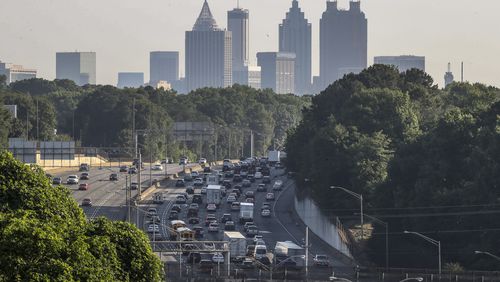Gas prices declined in Georgia over the holiday weekend, even as many residents hit the road for their first vacations since the start of the pandemic.
The average price of gasoline was $2.91 per gallon on Monday, according to AAA, two cents less than what Georgians paid a week ago.
However, prices are still 22 cents higher on average than what Georgia motorists paid last month, before Colonial Pipeline shuttered its 5,500-mile system following a cyberattack. That prompted panic-buying across the Southeast.
Supply chains in the region are still catching up from the shutdown, which lasted six days and showcased the extent of Georgia’s energy security vulnerabilities.
About 29% of metro Atlanta’s gas stations are still without fuel, according to the crowdsourcing app GasBuddy. But Patrick De Haan, the company’s head of petroleum analysis, said the true number of dry pumps is likely lower.
“As the situation has improved, people are not reporting as quickly or as often as stations are being replenished,” he said Tuesday. “I would be surprised if it’s still 29%. I would expect it to be maybe half of that.”
Even as supplies have improved in recent days, diesel is still harder to come by in metro Atlanta than regular unleaded gasoline.
“For gas stations, 85% or so of their total sales tend to be regular, so it’s not a surprise that stations have focused on replenishing that the quickest,” De Haan said.
Heading into the summer driving season, gas prices are “relatively steady” for now, said Garrett Townsend, a spokesman for Georgia AAA. But, he said, prices “are typically unpredictable and volatile.”
Fuel demand is increasing as more Americans get vaccinated and want to use the vacation and paid time off they have accrued during the pandemic. And, with some foreign destinations still closed off to tourists, more Americans could opt for domestic vacations within driving distance.
The auto club reported that, for the week ending May 21, fuel demand leapt to the highest reported number since COVID-19 brought normal life to a screeching halt in March 2020.
“Gasoline supply and demand levels are looking more like typical summer numbers as demand has steadily jumped week-over-week since the end of April and supply declines,” AAA spokesperson Jeanette McGee wrote Tuesday. “The increasing demand and decreasing supply combined with more expensive crude oil prices mean gas prices are likely to fluctuate throughout June.”'
About the Author







